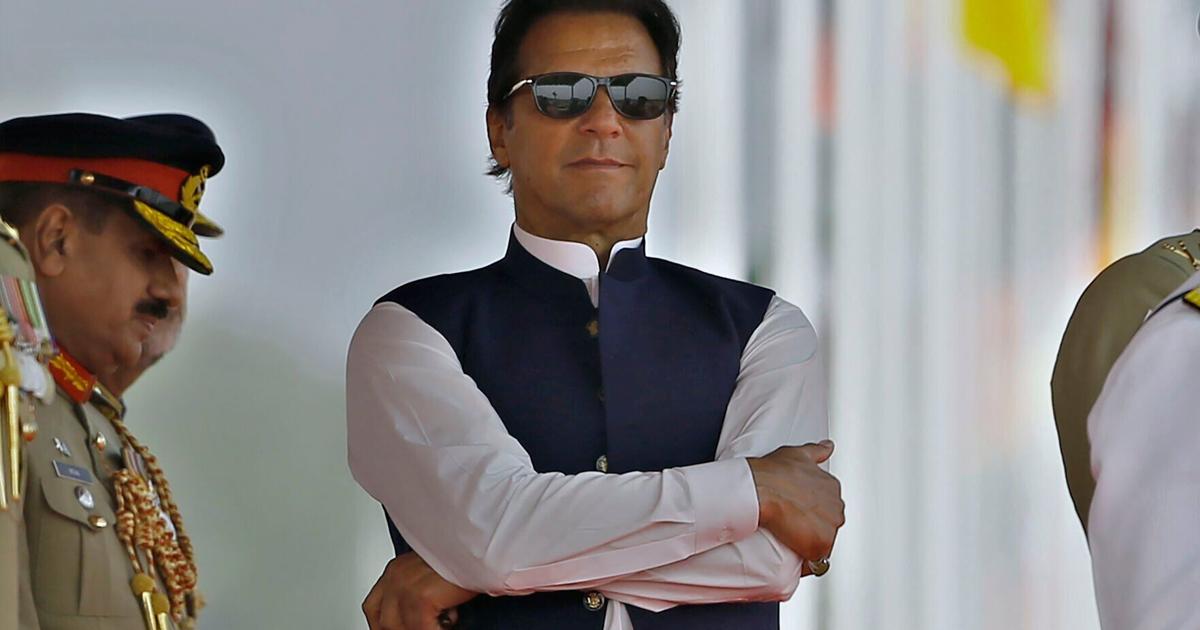
Former Pakistan Prime Minister Imran Khan may face renewed charges of treason, and a possible trial with a clutch of petitions filed before various courts. Ironically, they cite the same provisions of the country’s Constitution that he had sought to use against his opponents during his last fortnight in power.
His hour of reckoning may yet come despite Chief Justice Athar Minallah of the Islamabad High Court rejecting one such petition as ‘frivolous’, also imposing a fine on the petitioner.
Khan declared the launch of a “freedom struggle” last Sunday (April 10) within hours of being voted out of power in the National Assembly, a process that he had fought hard to block when he realised that he had lost the majority support in the legislature.
The relevant provisions of the Constitution are Article 5(1) A and Article 6. Under the heading ‘Loyalty to the State and Obedience to the Constitution and law’, Article 5 of the constitution of Pakistan has two clauses: Clause (1) states that “Loyalty to the State is the basic duty of every citizen”
Clause 2 states that “Obedience to the Constitution and law is the inviolable obligation of every citizen wherever he may be and every other person for the time being within Pakistan”.
Section one of Article 6 states, “Any person who abrogates or subverts or suspends or holds in abeyance, or attempts or conspires to abrogate or subvert or suspend or hold in abeyance, the Constitution by use of force or show of force or by any other unconstitutional means shall be guilty of high treason.”
The second clause says that a person will be considered guilty if she/he is aiding, abetting or collaborating in the acts. Clause 2A states, “An act of high treason cannot be validated by any court, including the Supreme Court and a High Court.”
The last clause directs the Parliament to provide “for the punishment of persons found guilty of high treason.”
These provisions apart, the Supreme Court had to repeatedly intervene to apply the corrective, first by taking note of the rejection of the no-confidence motion in the National Assembly and summoning all parties for a four-day hearing.
Despite serious concern from the government’s legal wing, Khan sent the Foreign Office diplomatic letter to Chief Justice of Pakistan Umar Ata Bandial, claiming that a foreign country sent a threatening message through Pakistan’s envoy. He thus implicated and embarrassed the apex court.
The likely trial may implicate all those who participated in blocking the parliamentary vote, a legitimate exercise under the Constitution. The move may implicate President Arif Alvi, National Assembly Speaker Asad Qaisar, Deputy Speaker Qasim Shah Suri and two of the vocal ministers in the erstwhile government, Shah Mahmood Qureshi and Fawad Chaudhary. They all belong to Khan-led Pakistan Tehreek-e-Insaaf (PTI) and indications were clear that they acted at his behest and under pressure.
Besides the political and parliamentary processes, however, the principal thrust behind the move is from the all-powerful army that has not taken kindly to its being implicated by Khan, its principal man who turned ‘rogue’ by first defying and disregarding the army, but on being voted out, also attacking it.
While also being dragged into the public and political discord, the army has also not taken kindly to Imran Khan persisting with his “foreign conspiracy” charge that implicates the United States, the country’s biggest benefactor, muddling diplomatic ties, and also casting aspersions on the new government.
The army brass, personally attacked through the crisis, may like to make an example of Khan and his supporters, irrespective of the positions they hold. Of them, President Alvi continues in office that gives him immunity from trial, while the Speaker and Deputy Speaker, and the two ministers have all resigned.
At the political level, while the new government would want to get on with its work, word has come from self-exiled PML (N) supremo Nawaz Sharif charging Imran Khan with “high treason” and calling for his trial. This may force the issue.
The final thrust may come from the Army. A close reading of the statement issued by the army ‘huddle’ at the 79th Formation Commanders’ meeting held on April 12 indicates the army brass’ angry mood and its anxiety to repair the damage the Khan-triggered crisis has caused.
It took note of the “propaganda campaign,” and attempt to “divide institution and society,” thus seeking to speak, and possibly act, in the name of all the state institutions.
It took note of the “recent criticism directed at the institution on social media” and expressed “complete confidence” in the leadership’s “well-considered stance to uphold the Constitution and the rule of law”.
“National security of Pakistan is sacrosanct. Pakistan Army has always stood by the state institutions to guard it and always will, without any compromise,” its publicity wing, the ISPR said.
It added that the forum expressed “complete confidence in the leadership’s well-considered stance to uphold the Constitution and rule of law at all costs”.
Dawn newspaper (April 12, 2022) pointed out that “Slogans critical of the army were also chanted during country-wide protests staged on Sunday in support of Khan.”
It quoted the ISPR’s statement that the army was “aware of its responsibilities and would continue to defend the territorial integrity and sovereignty of Pakistan against all internal and external threats under all circumstances.”






